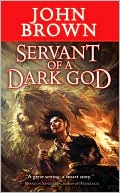Key Conditions for Suspense:
Part 11 – Make the problem hard to solve with disadvantages
by John D. Brown
 The following is part of a continuing series. If you wish to start at the beginning, head to It’s All About The Reader.
The following is part of a continuing series. If you wish to start at the beginning, head to It’s All About The Reader.
Readers want to hope and fear for a character. To feel this, they must not know what WILL happen, but do need to suspect or know what MIGHT happen and feel tension about the possibilities. They want that tension to build, and then they want to feel a cathartic release.
The reader will continue to feel that tension as long as the problem is unresolved (the danger or menace remains, the character continues to suffer hardship, the mystery becomes more puzzling) AND the situation changes in such a way that the reader’s worry grows.
How do we make sure the problem persists and intensifies for forty to seventy scenes (an average range for many novels) despite the character’s efforts?
Easy. Plot is nothing more than the character’s attempts to solve the problem and the results of those attempts. There’s no mystery to it. A character has a problem. Character tries to solve the problem. And something happens as a result.
The key is to remember that the plot has a job to do. You can’t have your characters go about solving the problem in any old way. You can’t have just any old results. Form follows function. To deliver what readers want, you have to develop the plot in a manner that builds the reader’s tension.
We do this by throwing OBSTACLES into our character’s path. We make the problem hard to solve.
There are four types of things that make the problem hard to solve: disadvantages, conflicts, growing troubles, and surprise. In this post I’ll introduce the first. However, before we get into this please remember that these aren’t ingredients to a recipe–they’re options. You don’t need to think up something for every category. You just need enough to bring the problem to life.
Put the Character at a Disadvantage
The first way we make the problem hard to solve is by putting the character at a disadvantage. The disadvantage may be a small, medium, or large, depending on your taste and the kind of story you’re telling. There isn’t one type or level that’s best for all objectives. But our characters do have to have some disadvantage; otherwise, there’s no reason for readers to fear for them.
Lack of knowledge
One of the most common disadvantages is a character starting off not knowing how to solve the problem. Or not having a critical piece of information that will allow them to solve it.
For example, think of all the murder mysteries you’ve read or seen. The character starts off not knowing who the killer is or why they did it. In the movie Taken, the father doesn’t know who kidnapped his daughter or where they’d taken her. He had all the skills and power to resolve the issue once he found her, but he lacked vital bits of information.
Sometimes the characters think they know what the problem is, but when they try to solve it, they realize they didn’t really know what the problem was. It’s called misdiagnosis.
For example, in The Incredibles, Bob goes to the island thinking his problem is a rogue robot. But his real problem is Syndrome.
In another story, a man might think his problem is that his wife is stepping out on him. When he tries to resolve that, he learns she’s actually being blackmailed.
In Dean Koontz’s The Husband, a gardener starts off thinking he’s being threatened by people who want to get to his brother’s money. He tries to solve that problem only to realize that it’s a plot by his brother to kill him.
Anytime your character doesn’t how to solve the problem or doesn’t know the exact nature of the problem, it makes the problem harder to solve.
Lack of skills or power
You can make a problem harder by limiting the character’s skill or power in some way.
Luke Skywalker knows the death star is going to blow a whole planet into smithereens. We have no question about what’s going on. Luke knows what he needs to do—start a chain reaction that will destroy the death star. What Luke lacks is the power to easily go in and execute the plan. He doesn’t have his own death ray. Doesn’t have computers that seem to be able to target with the precision he needs. All he’s got are dinky little X-wing fighters. He’s limited in his ability.
Here’s another example. Let’s say a Jewish woman is taken by the Nazis. Her lover, who is a German soldier, wants to rescue her. But the lover has no power to order the men to release her. He has no money to pay them off. This doesn’t mean he can’t rescue her. But it does mean he’s going to have to find some other way. It means resolving the issue is going to become much harder.
Personality flaws
Sometimes personality flaws can put the hero at a disadvantage.
Maybe the hero is recovering from an addiction to some drug and finds himself being required to snort a line in front of the villain to prove he’s legit. Maybe he’s a bigot and won’t accept the help of a woman, but she’s the only one with the key to resolving the story problem. Maybe he’s too proud to admit he’s wrong. Maybe he’s a slob and loses things, including the key to the getaway car. Maybe he doesn’t know when to stop drinking. Maybe his lack of self-control leads him to follow after a woman who comes on to him and then leads him right into the hands of the villain. Maybe he lacks social graces, but needs some high class to infiltrate the villain’s circles. Maybe the character has an issue with trust, has been burned too many times, and begins to suspect the other team members.
Maybe the character’s virtue is the source of his flaw. He’s so willing to see the good in people he blinds himself to who the villain really is. She’s so committed to doing her duty that she’s sacrificing her chance at a loving relationship for it.
Of course, flaws affect our sense of deservingness. Take personality flaws too far and our hero will become annoying or despicable. At that point, the reader stops rooting and worrying for them. Still, flaws can be a rich mine for making the problem harder to solve.
Handicaps
If all a character needs to do is snap his fingers to solve the problem, then readers can’t worry for him. Unless, of course, he’s missing fingers. Any handicap will put our characters at a disadvantage.
Sometimes the handicap is physical. In Seabiscuit, the jokey is blind in one eye. This makes it very difficult during a race to see when someone is riding up on his blind side. It also makes it hard for him to see openings ahead. It puts him at a disadvantage in a race. In the movie Wait Until Dark, three criminals threaten a woman who is blind. In Gattica, the hero has DNA that makes him weaker than the others wanting to travel into space.
In other stories, the handicaps might be emotional, mental, or social. In Forrest Gump, the hero is mentally handicapped. In other stories, heroes are tormented by fears of snakes, spiders, being alone.
Handicaps can be interesting all by themselves, but when they become a disadvantage to the hero’s goal of solving the problem, they affect suspense.
Time limits
Another disadvantage is having a time limit. Of course, a time limit of a gazillion years doesn’t make most problems harder to solve. Time limits put our hero at a disadvantage when they don’t allow any wiggle room or when they simply don’t allow enough time to solve the problem by normal means.
Next time you read a book or watch a movie, notice how many deadlines, ticking clocks, and time bombs are used.
We Want Underdogs!
In the end, the disadvantages our characters have are only useful if they make the character the underdog when compared to the opposition. Our hero can have all sorts of great qualities, and we want them to be exceptional in some way, but the opposition must have something that gives them the advantage–more money, more power, more knowledge, more connections, more training, more whatever is important in the story.
For example, In Raiders of the Lost Ark, Indiana Jones has mad skillz and knowledge, but he’s outnumbered, outgunned, and outfinanced. And the Nazi’s always seem to beat him to the punch. In Dean Koontz’s The Good Guy, the hero has great skills, but it’s just him against the U.S. government. In The Lord of the Rings, we’ve got a wizard who can work wonders and an elf that can see and hear for miles. But Sauron has so much more. By the end, all we are left with are two little guys and a smelly freak job.
The opposition’s advantage doesn’t always have to be huge. Sometimes the hero is the underdog simply because he starts two or three steps behind the villain. In fact, the first part of many stories feature the hero just trying to catch up. The point is that making the hero an underdog allows readers to fear for her. And it makes her victory that much more sweet. When do you cheer more? When your non-ranked, underdog sports team beats the number one team in the nation, or when your champs slaughter the local pee-wees?
We love rooting for underdogs. Of course, that’s only one type of obstacle. In the next post, we’ll talk about conflict, the next method for making the problem hard to solve.
Happiness,
John
•••
 John Brown is an award-winning novelist and short story writer. Servant of a Dark God, the first book in his epic fantasy series, was published by Tor Books and is now out in paperback. Forthcoming novels in the series include Curse of a Dark God and Dark God’s Glory. He currently lives with his wife and four daughters in the hinterlands of Utah where one encounters much fresh air, many good-hearted ranchers, and an occasional wolf.
John Brown is an award-winning novelist and short story writer. Servant of a Dark God, the first book in his epic fantasy series, was published by Tor Books and is now out in paperback. Forthcoming novels in the series include Curse of a Dark God and Dark God’s Glory. He currently lives with his wife and four daughters in the hinterlands of Utah where one encounters much fresh air, many good-hearted ranchers, and an occasional wolf.
For a list of all of the posts in this series thus far, click on the “John D. Brown” tag.


